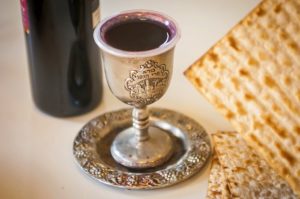
The Jewish holiday of Purim recently concluded, and Passover is about to begin. Both holidays acknowledge that threats of annihilation of the Jewish people were stated goals. In Purim, a Persian minister issues an evil decree to murder every Jew. In Passover, the Jewish people were enslaved and later attacked by the Amalekite nation shortly after the exodus from Egypt. Today, when Purim and Passover are celebrated, we rejoice because yet again good triumphed over evil. This is our story.
The Holocaust, too, was a horrible episode in the history of the Jewish people, but there is more to the story that, as a father, I have tried to impart to my children.
We must learn about the Holocaust, but it cannot define who we are as Jewish people — that misses the mark. As a “people of the book,” it is analogous to skipping over several chapters while reading a novel; so much of the narrative is excluded.
The story begins with creation, knowing our patriarchs and matriarchs and how Judaism introduced the world to monotheism, a belief in one God. Early chapters in the Jewish story include the chronicles of Joseph, who became the ruler of Egypt, second in command to King Pharaoh. Joseph was revered in the land of Egypt, but after Joseph’s death, the Jewish people were enslaved.

Survived, thrived
Throughout history Jews prospered in many countries, only to see their circumstances change over time. Jews faced pogroms, the Spanish Inquisition and, yes, the Holocaust. Jews had achieved success and made positive contributions to Germany’s culture, arts and economy before they were targeted for extermination.
But wherever persecuted, Jews survived and, ultimately, prevailed. This is the part I make sure to tell my children. This is the part that can help in the fight against antisemitism.
I teach my children that the foes of the Jewish people have been vanquished to the dustbin of history while the Jews are still here after 3,000-plus years. I teach them that we are not victims. Antisemitism grows because there is a perception that Jews are powerless and easy targets. Therefore, I talk to my children about being strong and proud.
When, every Friday night, my wife lights the Sabbath candles and my children sing songs, I know that those who tried to harm Jews did not win. Also, I see how so many families pass on Jewish pride and joy to the next generation. Those who were behind a “final solution” or who formulated plans of destroying Jews and Judaism failed.
This year, Holocaust Remembrance Day, also known as Yom Hashoah, is on April 18. The Days of Remembrance begin on Sunday, April 16 and conclude on Sunday, April 23.
During Holocaust Remembrance Days, introducing to students studying the Holocaust that Jewish people are victims brings the opposite of what teaching the Holocaust is intended to do. Bullies prey upon those they believe are weak. Bullies act when they perceive there is a vulnerable person or group. The Jewish people must be seen for how they continue to move forward despite pogroms, the Spanish Inquisition, and the Holocaust.
A lesson
People of the Jewish faith are not victims. They are spiritual leaders, teachers, Nobel Prize winners and leaders in technology, medicine, science and disaster relief. When Jews are no longer defined as victims of the Holocaust, a shift in the way Jews are portrayed may result in reversing the rising tide of antisemitism.
Jews have survived and will continue to outlast those who seek to harm us. My message to my children comes from Genesis (12:3), where it is written that God “will bless those who bless the Jews and curse whoever curses the Jews.” This is what needs to be heard by those who spew hatred and spread antisemitism.
During the Days of Remembrance, we do what Holocaust victims asked as final requests before their deaths: “Remember us. Tell our story.”
I want my children to go one step further and contribute to the narrative of the Jewish people, understand the beauty and also the importance of what happened in the past, and take the responsibility from the patriarchs and matriarchs of continuing the story. With God’s help, the best chapters are yet to come.
Martin Karp, Ed.D., is dean of academic affairs and community engagement at Talmudic University and its consortium of schools. He was a member of the Miami-Dade School Board for 16 years and has worked in education for more than 30 years. talmudicu.edu

Comments